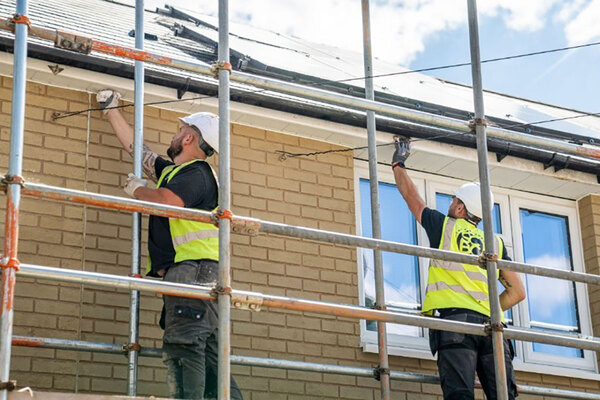What impact could the Levelling Up White Paper have on regional inequalities?
In February, the government published its Levelling Up White Paper, which contained ideas to tackle regional inequalities. Inside Housing spoke to Mark Cook at Anthony Collins Solicitors to discuss the effects

In association with:
![]()
In February this year, the government finally unveiled its long-awaited Levelling Up White Paper. The 305-page document contained a lot of ideas to tackle regional and local inequalities. It is seen as one of the flagship policies of the current Conservative government as it looks to retain the so-called ‘Red Wall’ seats that were won in the 2019 general election.
“I am determined to break the link between geography and destiny,” wrote prime minister Boris Johnson in the foreword to the document. Despite the publication of the white paper, levelling up is still seen as rather woolly.
But what aspects of the government’s levelling-up initiative will affect housing associations and councils? What role can they play if given the chance? What are the challenges these organisations face in dealing with the levelling-up agenda in the long term?
We talked to Mark Cook, a partner at law firm Anthony Collins Solicitors, to find some answers.
What impact will the Levelling Up White Paper have on the housing sector and councils?
For housing associations, the immediate issues are the fact that they have the requirement of increased accountability to tenants in the post-Grenfell environment and the review of the Decent Homes Standard that was mentioned in the white paper. This is about housing associations simply putting their houses in order, but will inevitably lead to less resource being used for new development and other activities.
For regional and local government, it can only be good news in terms of devolving more power to them. A key factor will be achieving simplification of local government. But it is important that this simplification is not just achieving efficiencies and economies of scale. Since austerity, there has been a diminishing resource of talent to lead in the public sphere.
There is also the government-commissioned Kruger report – Levelling up our communities: proposals for a new social covenant – which was published in September 2020 and contained recommendations on enabling civil society’s contributions to levelling up. But we’re not sure the government’s response shows a real understanding of what is required to enable and deliver investments beyond what might be regarded as fairly tokenistic.
Ultimately, though, levelling up is about addressing geographical inequalities. So the impact goes way beyond housing associations and local authorities as the proposals are intended to have a major effect on everyone in the UK.
The white paper proposes scrapping the 80/20 rule, which sees 80% of funding for housing supply directed at ‘maximum affordability areas’, effectively prioritising the South East. How significant is that proposal?
We do not actually see how the government can achieve its levelling-up ambitions without scrapping the 80/20 rule. This will be a key test for the success of the government’s levelling-up agenda. The proof will be in the pudding and how quickly it can be done. The significance of scrapping it can’t be overstated.
Do you think there should be a separate fund for councils and housing associations to help deliver the levelling-up agenda?
Yes. There seems to be a resistance at the moment from the government delivering on single pots because it’s too complicated for the Treasury. There is a lot to be learned from what has been done in the past.
We need something that brings together all the components, such as building new houses, retrofitting, contributing to neighbourhoods and better estate investment, which is not just about capital but also actually creating opportunities for people.
A single levelling-up social housing fund would be really worth pursuing. The programmes should last for three years at the bare minimum – or possibly even be five-year programmes. It is a big idea, but if we could
do it, that would be great.
And Homes England would have a great role to play in all of this.
Mark Cook is a partner at Anthony Collins Solicitors. He advises local authorities, housing associations and other organisations on how to navigate the law related to collaborative ventures and better public services.
With 32 years’ experience advising across the public, private and civil society sectors, Mark believes that those on the ground make the most difference in their neighbourhoods.
Are there examples of local authorities leading the way in terms of how the levelling-up agenda can be translated locally?
I think Bristol City Council is doing things that are working effectively, such as working in joint venture with the private sector. It has basically taken the approach of looking at all the options available because there is just so much housing and provision needed for the local population.
The West Midlands Combined Authority is another good example. It is leading the way on working to develop affordable housing on brownfield sites.
But some councils don’t adopt these approaches as they have a particular ideological way of delivering more housing.
What changes in the local authority landscape would you like to see that would impact the agenda?
We would like to see more devolution deals with elected mayors in the regions. However, in the short term, this could result in a slow-down of decision-making. Reorganisation has to be done well, and it has to be recognised that in doing so, it might divert time or attention from moving forward with the levelling-up agenda. But, equally, to enable better decisions to be made with the right quality of expertise, it’s a good thing long term.
So people should not expect immediate results from reorganisation. It is not just about resources, it is about the new authorities connecting with their communities.
In numbers
2019
The year the Conservatives won ‘Red Wall’ seats, leading to the creation of the levelling-up policy
80/20
Rule that sees 80% of grant going to areas of maximum affordability
Where does the government’s net zero agenda sit within the levelling-up agenda?
The Levelling Up White Paper does not really get to the meat of the issue around net zero. We think the government’s climate change agenda sits above the levelling-up agenda, but that’s not apparent from the white paper.
Energy efficiency should be a key factor in helping shape what the new Decent Homes Standard looks like. But I think what this requires on a regional and local basis is smarter procurement and smarter central commissioning.
Also, the construction industry would benefit from a joined-up programme for tackling climate change that enables them to build greater skills and capacity, particularly among small and medium-sized organisations, which make up the vast majority of the construction industry. And this will enable them to tackle not just social housing but also allow private homeowners to tap into it.
Is there anything else you would like to see included in the final levelling-up proposals that emerge?
There used to be a power to promote well-being of local authorities, which got abolished. I think it needs to be brought back so that all local authorities have the duty to promote well-being and help future generations.
This would be a powerful enabler of the levelling-up agenda that would work in harmony with the climate change agenda.
Sign up for our daily newsletter
Already have an account? Click here to manage your newsletters




